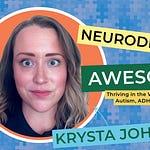[NOTE: This is an extra post this week. You’ll receive a post tomorrow closing out the fitness and burnout series as well as the weekly FFS post on Friday.]
For the 4th episode of the Go Long show, I’m very excited to have hosted Rabbi Paul Strasko. This is an important conversation not just for the Jewish community, but for our allies as well. Substack has auto-generated some clips, but I’ll be posting my own on Instagram and YouTube. Given the nature of the discussion, I encourage you to listen to the whole dialogue as it’s pretty nuanced.
In this episode, we're getting serious about antisemitism and burnout. How do we do our duty of knowing past precedent and the importance of calling out antisemitism in real-time while also protecting our mental health?
The overwhelming feedback from attendees was to schedule a follow-up session so I am going to be working on that. In the meantime, please send your feedback on this episode on what other information you are interested in.
Rabbi Paul’s Bio
Rabbi Paul began his professional journey as a musician, studying clarinet performance and composition at the University of Montana before advancing to graduate studies in music theory at Temple University. Though not a native, he often identifies with Philadelphia due to his transformative experiences there. HRabbi Paul’s career path took an unexpected turn when he transitioned to project management in the healthcare and pharmaceutical sectors, where he remained for thirteen years.
A profound engagement with his synagogue in Seattle led Rabbi Paul to rabbinical school at Abraham Geigerkolleg in Berlin, an institution reestablished after its closure by the Nazis in 1942. He became possibly the first American ordained as a rabbi in Germany and continued his rabbinical duties across Europe and the U.S. After battling burnout, Rabbi Paul redirected his focus to writing and community service, contributing through his YouTube channel, Beit Virtuali, and an educational membership group, Beit Virtuali. His story is marked by continuous growth and adaptation, embracing new challenges and reinventions. Rabbi Paul currently resides in Germany.
Quick Takeaways
Rabbi Paul:
Constant education is critical, which includes the constant re-evaluation of what you consider a trusted source.
Even as an educator on Judaism, he’s continually reminded that he must do his own homework on our history as well as the history other religions.
As a result of reactions to the atrocities of October 7th, he knows that some relationships may be irrevocably altered even if some kind of reconciliation takes place.
Jill:
Inspect in order to expect. Understanding the evolution of antisemitism is important to understand where their hatred is rooted from.
You can’t hit what you can’t see. The volume of antisemitic content is orders of magnitude more than pro-Jewish content.
In spite of lost friendships, think about antisemitic behavior as not personal to you (this will be hard). Much of antisemitism exists due to preconceived notions.
And much more…
Major topics covered
Being Jewish is part of our identity so understanding who is now not part of my “who am I going to call at 2am?” crew is important, even if that has changed post-October 7th.
Antisemitism may all lead to the same place, but it is important to understand what is driving it regardless of which side of the political spectrum it originates from.
The impact of H@m@s being very effective at marketing is shown on US university campuses everyday and it’s very challenging to counteract.
20% of people under 25 in the US believe that the Holocaust didn’t happen.
20% of Japan holds antisemitic views without ever meeting a Jewish person in their lives.
How to deal with friends and colleagues who are not interested in “doing the work” to understand how the Jewish community is feeling now
The importance of doing the research on how antisemitism has evolved and why it is resonating with people so we can rewrite a more accurate narrative of Judaism
Ways to connect with Rabbi Paul:
Ways to connect with Go Long:
Sign-up for Go Long’s newsletter, which is published twice per week
Schedule a complimentary consultation
Learn more about Go Long’s offerings
Timestamps
00:00 – 01:59 – Introduction and purpose for the discussion. How do you balance staying up to date on news and calling out anti Semitism in real time, because we all know what happens when we don't call it out in real time. And then figuring out how to protect our mental health to prevent burnout, which is core to Go Long’s mission with clients.
02:00 – 05:59 – Rabbi Paul talks about his path to becoming a rabbi as well as the course he has charted for himself to his role as an educator and author in today’s world, plus his work with Beit Virtuali.
06:00 – 07:59 – Rabbi Paul’s thoughts on why no easy answers exist for balancing antisemitism and burnout, and why we need to look inwards first before expecting others to help.
08:00 – 10:59 – Jill and Rabbi Paul discuss the shock of finding out that people who they walked with are not just choosing to walk with us, but actively walking against the Jewish community.
11:00 – 13:29 – Rabbi Paul discusses the importance of understanding where antisemitism comes from regardless of which side of the political spectrum it originates from. He also covers how unprepared he was for the aftermath of October 7th, even as an educator.
13:30 – 14:59 – Rabbi Paul talks about the importance of who are you going to call at 2am if you need help? Who can you really trust in these times? Also discusses how visceral this experience is for Jews in America who are seeing such raw antisemitism for the 1st time.
[NOTE: UK-based attendee commented it is very unsafe for them.]
15:00 – 15:59 – Rabbi Paul talks about prioritizing that core group of people you can trust, as opposed to trying to win over your thousands of LinkedIn connections or hundreds of Facebook friends. Build your bridges from your core group and then re-expand.
16:00 – 20:59 – How challenging it is to have a quick retort to people who want to summarize a long-standing conflict that has plenty of nuance into sound bites, plus dealing with a global press corps that doesn’t bother to fact check. H@m@s has overperformed in their marketing and recruitment, as evidenced by what’s happening on US college campuses.
21:00 – 23:29 – Jill talked about her experience with a journalist from The Seattle Times that “both sides’ed” the antisemitic behavior at the University of Washington. The rules are different for the Jewish community than they are for other marginalized groups when it comes to being able to call out slurs against us.
23:30 – 24:59 – Rabbi Paul talks about how Jews like to inject humor whenever possible, even in difficult times. He also introduced the term “Moloch” in the context of social media and how all-consuming it is.
25:00 – 26:59 – Rabbi Paul gets into the sheer numbers of antisemitic posts on TikTok, IG, FB, etc. that need to be counteracted. Then covers the amount of Jewish people as a percentage of the overall population (it’s 0.2% of the global population, which is 16 million people).
27:00 – 29:59 – Rabbi Paul talks about how when people are confronted with the truth about how few Jews are on the planet as a percentage of the larger population, their rationale for scapegoating goes away. That causes a problem for antisemites. Then he makes the case how antisemitism isn’t personal, which doesn’t make it better, but allows you to reframe how you respond.
30:00 – 34:29 – Jill talks about how painful it is to have lost close friendships since October 7th. Rabbi Paul talks about understanding how non-violent communication works and how it can be applied to someone’s anxiety around dealing with Judaism. Lots of repercussions in terms of relationships going forward, even if “peacefully resolved”. Rabbi Paul talks about how the mourning process can apply to some of the relationships that have been lost since October 7th.
34:30 – 37:59 – Attendee shares how hurtful it has been with well-meaning friends who wouldn’t consider themselves antisemitic (which she agrees with) but aren’t willing to do the work on what antisemitism actually is as well as what it looks like today. Also discusses the stark difference between what is happening today vs. what happened post George Floyd’s murder. No one is interested in proactively “doing the work” on behalf of Jews.
38:00 – 46:59 – Rabbi Paul gets into how we all need to do more work on the history of the state of Israel and understand more about the traditions of Judaism, which also includes significant overlap with Islam. Lots of misappropriating is taking place with Jewish culture and religion, and it being done incorrectly. He then explains how Christianity and Islam are redefinitions of Judaism. Rabbi Paul educates the group on some of the lesser known similarities between Islam and Judaism. He stresses how we all need to know our story better, including himself.
47:00 – 48:59 – One of the attendees talks about the privilege that certain groups have around not having to be knowledgeable about history. Lots of people do not have to be knowledgeable about the Holocaust, but because we are – we need to be vigilant about the dangers of antisemitism.
49:00 – 50:59 – Rabbi Paul talked about his outreach to his Muslim friend in New Zealand after the Christchurch mosque shooting, and how he asked for some book recos to understand their perspective. He then shared them with his congregation with a plan to have a conversation on their thoughts. But no one read the book. It’s not about rights. It’s about responsibilities.
51:00 – 53:59 – Jill talked about the collective outrage over what happened in the Pittsburgh synagogue massacre, but that same support did not extend to what happened in Israel. Rabbi Paul suggested understanding the history of antisemitism, and it consists of 4 different phases right now with the current phase being about Israel. He then covered the hypocrisy of the criticism of China vs. what’s happening to the Uyghurs as well as what’s occurred in Yemen and Syria. We need to understand the differences between Islam and Islamism.
54:00 – Closing and thanks to Rabbi Paul.












